Nutmeg is popularly known as Jatiphal and Jaiphal in India. Profound Nutmeg health benefits make it a significant herb in Ayurveda. It’s one of the oldest spices like pepper and clove cultivated for over 1000 years. Nutmeg is a spice made from the seed of Myristica fragrans, a tropical evergreen tree that is native to the Banda island of Indonesia. Also commonly grown in the Caribbean, other tropical areas of the world and, in southern India mainly in the state of Kerala. Nutmeg seed is oval-shaped about an inch long, slightly wrinkled and dark brown on the outside and light brown on the inside. Since centuries nutmeg is treasured for its flavor, aroma and medicinal properties throughout the world. It is among those grandma’s remedy for treating indigestion, cold, fever and headache. ( 1 )
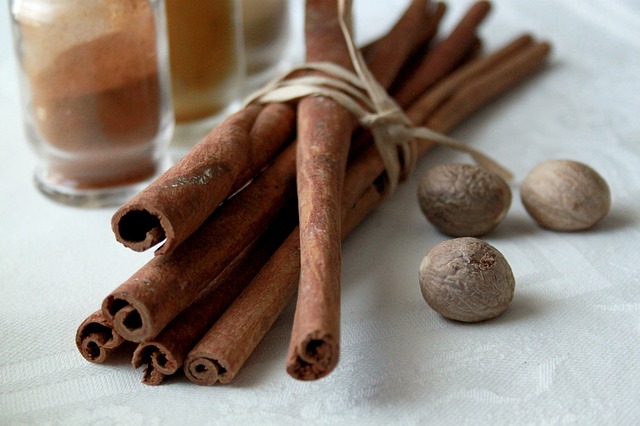
Health benefits of Nutmeg
The seed may be small in size but you will be amazed to know of its impressive nutritional profile and offers an abundance of health as well as beauty benefits.
1. Antioxidant properties of Nutmeg
Nutmeg contains an array of antioxidant compounds including plant pigments like cyanidins, essential oil, such as phenylpropanoids and terpenes, and phenolic compounds, including protocatechuic, ferulic and caffeic acids. Test tube studies have also shown that nutmeg extract exhibits powerful antioxidant effects against free radicals. This antioxidative properties prevents the onset and progression of many chronic conditions, such as certain cancers and heart and neurodegenerative diseases. (2, 3)
Anti oxidant activity of spices
| NAME | ANTI OXIDANT ACTIVITY DPPH * ( trollox equi )mg/100 grams |
| Nutmeg | 1438 |
| Clove | 16532 |
| Staranise | 6174 |
| Cinnamon | 8030 |
| Mace | 1318 |
| Turmeric | 1088 |
| Sajeera | 947 |
| Cumin Seeds | 743 |
| Fenugreek seeds | 488 |
| Mustard Seeds | 417 |
| Pepper | 402 |
| Bay Leaves | 356 |
| Coriander Seeds | 263 |
| Red Chillies | 193 |
| Cardamom | 170 |
| Asafoetida | 129 |
*2,2′ – Diphenyl -1- Picryly Hydrazyl (DPPH) radical scavenging activity.
Souce – Annual report 2006 -2007, National Institute of Nutrition, Hyderabad.
2. Anti-inflammatory properties of Nutmeg
Many diseases have been attributed to inflammatory processes, which are involved in the onset and maintenance of many health disorders like rheumatoid arthritis, asthma, type 2 diabetes, cancer, and chronic inflammatory bowel. Animal studies demonstrated a significant reduction in inflammation-related pain in joints when ingested with nutmeg oil. Nutmeg has many essential oils myriatic, elemicin, and eugenol help in relieving inflammatory pains. Nutmeg oil can be applied externally to the affected area to relieve joint and muscle pain. (4, 5, 6, 7)
3. Anti-bacterial properties of Nutmeg
Eugenol present in nutmeg prevents tooth cavities and gum diseases. It is effective against potentially harmful bacteria like Streptococcus mutans and Aggregatibacter actinomycetemcomitans present in the mouth which is responsible for causing dental cavities, gum diseases, and bad breath. Test tube studies demonstrated powerful antibacterial properties of nutmeg extract which effectively destroyed harmful bacteria in the mouth and thus prevented bacterial-related oral health issues. Nutmeg extract is commonly used in toothpaste and mouth wash in organic or herbal type. ( 8, 9 )
4. Fights cancer.
One of the lesser-known facts about nutmeg is its potential use in treating cancer. A study conducted by the National cancer institute of Maryland demonstrated the chemopreventive properties of nutmeg extract. It is found to induce cell death in leukemia cells. (10)
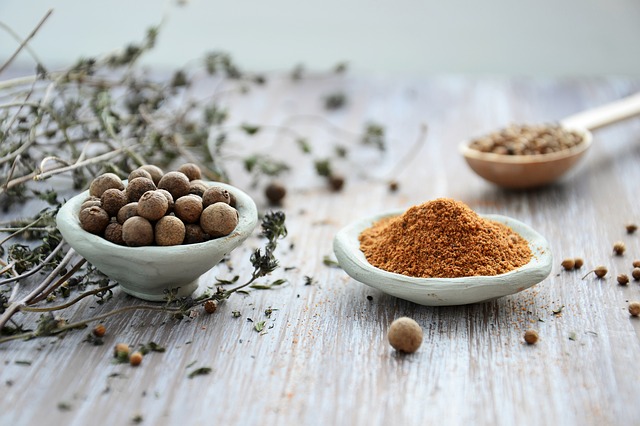
5. Boosts Immunity
Nutmeg is a good source of essential nutrients like potassium and calcium which increases our body’s resistance power and helps fight against various germs and bacteria, thereby boosting our immune system and thus maintaining our overall health.
6. Fight Depression and Anxiety
The case study published highlighted the antidepressant activity of nutmeg. nutmeg is a natural healer for anxiety and depression. The compounds myristicin and elemicin in nutmeg offer mild sedative and anti-anxiety benefits by activating neurotransmitters serotonin and dopamine in the brain, which helps the body and mind to cope with stress. The essential mineral magnesium in nutmeg has been demonstrated to relieve symptoms of both mild to moderate depression. (11, 12)
7. Boost Brain health
The nutmeg has been used since ancient times by Greeks and Romans to stimulate the brain and improve its functioning. The compound myristicin in nutmeg is responsible for good memory and concentration by stimulating the nerves in the brain and also inhibits an enzyme that contributes to Alzheimer’s disease. A 2009 study published in the Journal of Neuroimmunology found that black wild nutmeg offer benefit for the brain and nervous system.
8. Fight insomnia
Nutmeg has sedative and calming properties which enables one to enjoy a sound sleep. Nutmeg is rich in the vital mineral magnesium, which plays a role in supporting deep, restorative sleep by maintaining a healthy level of GABA a neurotransmitter that promotes sleep. Adding a pinch of nutmeg powder to a glass of warm milk and drinking before going to bed can provide good sleep.
9. Aids Digestion
Nutmeg eases common nausea, vomiting, indigestion, bloating gas, and diarrhea. It helps to increase the secretion of gastric and intestinal juices thus improving digestive health. It had a carminative effect on the digestive system. Nutmeg is rich in fiber content, thereby helping to assist the peristaltic movement through intestinal pathways and ease the digestive processes.
10. Treats acne
Nutmeg is a natural skincare ingredient. Anti-inflammatory, antibacterial, and astringent properties of nutmeg help the skin to glow, remove blemishes, and treat acne. Its antioxidant nature helps fight free radical damage, which is important for maintaining acne-free skin. Nutmeg powder mixed with honey and milk can be used as a natural mask on the face, helps control excess oil, and removes pigmentation.
11. Rich in minerals and vitamins
Nutmeg is a good source of potassium, calcium, iron, manganese, copper, magnesium, vitamin B1, and B6. Potassium is an important component of cell and body fluids that helps control heart rate and blood pressure. The human body uses manganese and copper as co-factors for the antioxidant enzymes, superoxide dismutase that repairs cells and reduces oxidative stress. Iron is essential for red blood cell production. while vitamin B1and B6 play a crucial role in supporting the healthy functioning of the nervous system.
Ground Nutmeg Spice Nutrition Facts ( 1 teaspoon = 2.2 grams)
| Calories | 12 |
| Total Fat | 0.8 grams |
| Saturated Fat | 0.6 grams |
| Sodium | 0.4 mg |
| Total Carbohydrate | 1.1 grams |
| Dietary Fiber | 0.5 grams |
| Sugar | 0.1 gram |
| Choline | 0.2 mg |
| Folate | 1.67 mcg |
| Niacin | 0.029 mg |
| Riboflavin | 0.001 mg |
| Thiamin | 0.008 mg |
| Vitamin A | 2.24 IU |
| Calcium | 4.05 mg |
| Magnesium | 4.03 mg |
| Phosphorous | 4.69 mg |
| Potassium | 7.70 mg |
References – Nutrional Value.Org
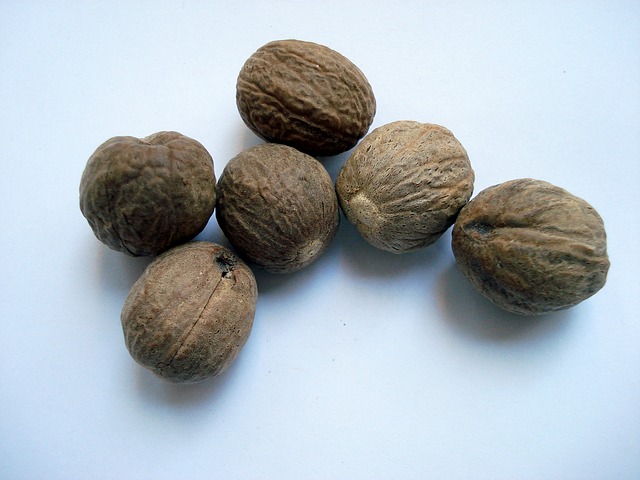
12. Maintains healthy liver and kidneys
The liver is a vital organ in our body, which constantly being exposed to various drugs, chemicals, and toxins by our unhealthy lifestyle. Nutmeg acts as a natural tonic and helps in detoxification of the accumulated wastes which are stored in the liver and kidney and eliminates them. Active ingredients in nutmeg also help to dissolve kidney stones and increase the overall function of the liver and kidney. (13)
Nutmeg in culinary uses:
This delicate, slightly sweet spice is used in cuisine all over the world. Just dusting or a pinch of its powder adds aroma and enhances the taste of food. In Indian cuisine, Nutmeg is used in many sweet as well as savory dishes, predominantly used in Mughlai cuisine. In Kerala, Malabar region, grated nutmeg is used in meat preparation and also sparingly added to dessert for flavor. In international cuisine, it is used for flavoring many kinds of baked items, pudding, potato, meats, sausages, and custards.
Jaiphal (Nutmeg) and Javitri (Mace) are called sister spices
Nutmeg interestingly is the host to one more incredible potent and unique spice mace or javitri,which is dried reddish nutmeg covering. Jaiphal and Javitri are sister spices. Both are distinctly different spices from single fruit of same evergreen aromatic tree. Mace and Nutmeg have similar taste qualities. Mace is often preferred in light dishes for bright orange saffron like hue it imparts, while Nutmeg is used when a stronger flavour is required. Both are used for medicinal purpose. Both the spices flavour up well in combination with other spices like pepper, curry leaves, cardamom, caraway, cloves to season curries, biryanis, appetizers.
Does Nutmeg cause adverse side effects like poisoning?
Nutmeg has come under considerable suspicion regarding its consumption as cases of nutmeg poisoning are being reported and circulated in the internet for some time. But reported cases are by accidental death in children or intentional recreational abuse with other drugs in teenagers. First of all, we have to understand that anything in excess can be harmful and as nutmeg being a potent spice is meant to be used in small quantities only. Toxic effects of this spice are linked to ingestion of large amounts and not the small amount typically used in kitchen. High dose of nutmeg can cause adverse side effects like hallucinations, drowsiness, dizziness, drymouth, confusion and other side effects including respiratory, cardiovascular and gastric distress. Myristicin in nutmeg a psychoactive substance is responsible for its harmful effect in large dose.so when used appropriately as a spice in small quantity, the benefits are obvious and outweighs the negative. (14,15)
Can pregnant women use nutmeg in limited doses in their diet?
As said earlier excessive can be harmful. Large amounts can harm pregnant women and fetuses.It inhibits the production of prostaglandins, which is important in the process of childbirth. so it better to avoid taking nutmeg in any meal to prevent any risk during pregnancy.

How much Nutmeg is safe?
A small amount of nutmeg can be used safely in cooking. Most recipes call for roughly 1/4-1/2 tsp of nutmeg which is very safe for consumption.
How to Choose Nutmeg?
There are two forms of nutmeg common grounded and whole form. Grounded form is very easy to use and inexpensive.Whole nuts can be easily grounded by a spice or coffee grinder.Whole nutmeg has a stronger taste and flavor.
How to Store Nutmeg?
Keep whole nutmeg in an airtight container and store in a cool,dark and dry place.Whole nut can be stored much longer than powder one. So, freshly ground the whole nutmeg whenever required and use immediately.If little amount is left then store it in airtight container and keep in refrigerator.
How to use Nutmeg to enjoy its benefits?
In cooking small quantities such as little grating or a pinch of ground powder are used to impart flavor and aroma to custard, rice pudding, cakes, eggnog. It tastes well with cheese and egg dishes and can be added to omelets, souffles, cheese-based sauces. It blends well with a milk-based drink such as hot chocolate drink, espresso. you can sprinkle little nutmeg powder over the foamy coffee. You will love these flavored drinks. Nutmeg goes especially well with chocolate, so you can add a pinch to melted chocolate when making cake or mousse.
Bottom line
Nutmeg is an exotic spice and a notable healer in its own. It is bursting with goodness that nourishes, repairs to cleansing your skin, heal acne to fixing bad breath, prevents inflammation, works on upset tummies and relieves tooth pain. Nutmeg and its essential oil contain an impressive array of powerful compounds that help prevent diseases and promote you an overall healthy living. To get the health benefits of Nutmeg use it in moderation. Regular spicing up a plain healthy meal is good for your taste buds and your health. Christmas is around the corner try using this flavorful and healthy spice in your cakes and cookies to share the nutmeg health benefits with your near and dear ones.

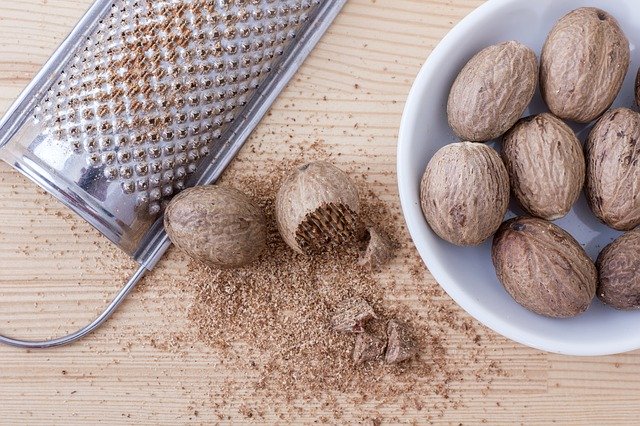
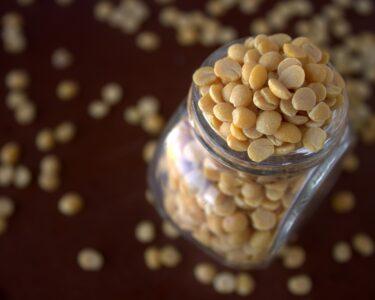

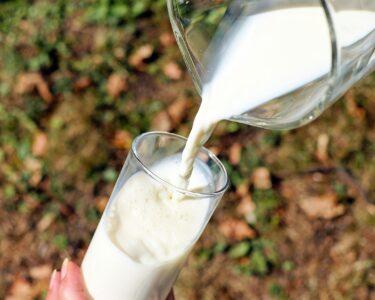
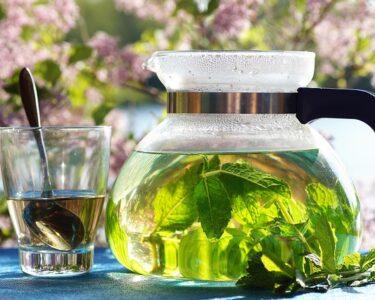
4 Comments